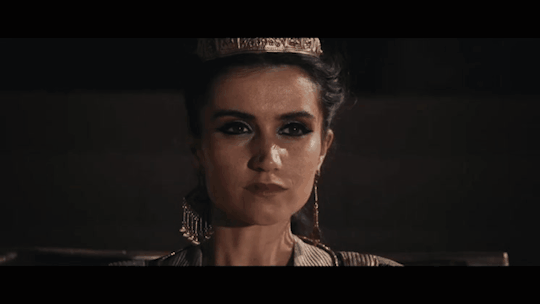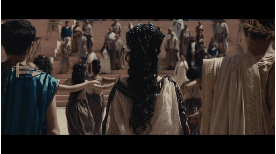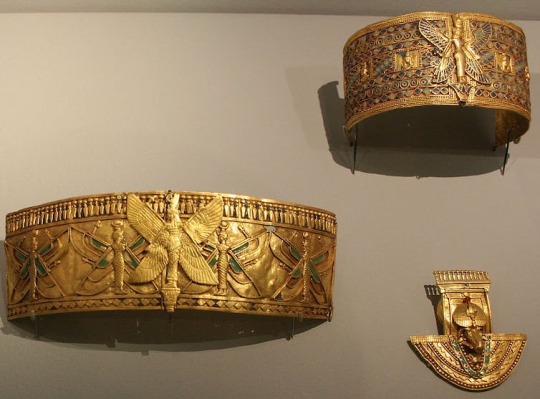#cleopatra documentary
Note
The anti-Arabism in the Cleopatra show is even more insidious than just picturing them as backwards; it and other Hotep ideologies portray them as essentially white/Asian invaders* in the same way you have people like the Black Hebrew Israelites (not to be confused with Jews that are black) adhering to the Khazar myth. It's a bizarre reverse weaponization of whiteness.
*The irony is that Cleopatra's family were literally white colonizers, and in the process of focusing on her, Hoteps not only speak over brown folks but ignore a wealth of black African civilizations.
.
7 notes
·
View notes
Text
Listen
Cleopatra's race matters cause she was a real person
Nani's race matters cause it directly affects her story
YOU KNOW WHO IS NEITHER OF THESE THINGS
A mermaid who somehow has working eardrums despite being underwater
#rambling#Lilo and stitch#lilo and nani#nani pelekai#Cleopatra#cleopatra netflix#Netflix#“oh its not realistc!!!” if it was realistic the little mermaid would be in the horror genre#Because realistically they would have smooth skin abd look like belugas#Also the mermaid myth likely came from manatees#So if you want realism just watch a documentary on manatees
125 notes
·
View notes
Text
I’m willing to agree with everyone when they say that the evidence we have for the historical Cleopatra VII is that she was Greek, with very little intermarriage, if any, with any Egyptians in her family tree, but I *do* think it’s interesting that the “Cleopatra was Greek. Deal with it” crowd are suspiciously silent when it’s, say, Wardah Khan or Leonor Varela playing her, neither of whom are Greek or Egyptian, for that matter.
Like, if accuracy is such an issue, why are they okay but a black Cleopatra isn’t?
#i think we can acknowledge that the claims that she was ABSOLUTELY black aren't an accurate reflection of what we know#while also accepting that Cleopatra has historically been important to a number of black artists#and that...so long as you aren't saying that Yes this is ABSOLUTELY what she looked like (the documentary)...it's fine#it's as accurate to cast a black woman as Cleopatra as either of the other two options#people just have a mysterious aversion to it
36 notes
·
View notes
Note
I don't know if you ever watch melodramatic docudramas, but I read that you know Spanish and there is this Spanish documentary about Fulvia (and Cleopatra) that might interest you https://www.youtube.com/watch?v=4lrSwC-NOlY&t=2429s
!!! Fulvia! ¡Me encanta! (Also love Cleo too, but it's so hard to find Fulvia content!) I watched the video and got mad when I realized it was only the first half of the show! Which is remarkable, because this thing is...it's something!
Fulvia's actress has so much poise and gravitas, I'm pretty sure if I weren't aroace I'd have a crush. She looks even better splattered with blood. <3
Clodius has the personality of cardboard, and I feel so bad for the actor because it's clearly the director's fault for not letting him ham it up in drag or punch dudes in the face. Let! Him! Sashay!!
44-year-old Cicero is portrayed as an old bearded fart yelling at clouds.
When they cut to a painting of the curia burning down so they didn't have to set the model on fire...
After said fire, and Clodius' solemn funeral, we immediately cut to...Julius Caesar, in the form of a slutty theater puppet. It's terrifying and hilarious.
Cleopatra steals every scene she's in. As she should. At one point Cicero picks up one of her scrolls and she's like "That's a book on contraceptives, want a copy?" and the narrator says, deadpan, "Cicero did not enjoy meeting the queen."
The intense 10-second gaze between Fulvia and Cleopatra is more sexually charged than every actual couple in the show.
Did I mention all this is presented by Santiago Posteguillo? The novelist? Alongside actual historians, but still funny.
Curio has apparently been yeeted from history altogether.
Several factual errors - Cicero was a witness at the Bona Deal trial, not a prosecutor; the populares and optimates were not political parties; Clodius was killed in a gang fight, not one-on-one; Roman women could own property and have praenomina, though the latter was rare in Fulvia's time; and Cleopatra first met Caesar in Egypt, not Rome.
I wouldn't recommend it for accuracy, but I would absolutely recommend it if you speak Spanish and like seeing scary women covered in blood. Be warned that it depicts animal death and graphic violence, too.
I'm absolutely going to be looking for the second half of this incredible...something. But even if I can't, I'm immediately adding this to my favorites list. Thank you, for whatever the hell I just watched.
#wolframpant#fulvia#documentary#cleopatra#docudrama#jlrrt watches#just roman asks#santiago posteguillo#fulvia y cleopatra:dos destinos cruzados
11 notes
·
View notes
Text
Lots of people complaining about The Mummy vs the new Cleopatra documentary but therein lies the issue: Cleopatra is claiming to be a historically accurate documentary, it is claiming to tell the “real” truth and even put out a statement on how Cleopatra’s ethnicity has been long debated (which, among scholars, no it really hasn’t, y’all just keep ignoring us when we say Cleopatra wasn’t black), but now they’re here to tell the real story that Cleopatra was really black and so was everyone in Egypt, especially the ruling class, at a time where they definitely were not as they were being ruled over by the Ptolemaic Greeks, while The Mummy was not claiming any historical accuracy or to be a documentary of real events, and that’s where a lot of the backlash is coming from.
#The most annoying part is that if you wanted to make a documentary about like#Someone who actually was Nubian or Cushite or whatever as the Egyptians called it#YOU COULD.#There were dark-skinned pharaohs and queens we know this#Do something about Queen Tiye or whomever#One of the other foreign dynasties that ruled Egypt that we know about#Smh people keep bringing up Cleopatra’s ethnicity like it’s still open for debate when it’s really not#Because they just want her to be black so badly even though she most emphatically was not#And lbr it’s mostly Americans doing this#Because Americans can’t conceive that other countries have different racial dynamics or makeup#And they can’t conceive that sub-Saharan Africa isn’t actually indicative of the ethnic makeup of all of Africa#text
40 notes
·
View notes
Text
my favourite genre of egyptian people reacting to the cleopatra documentary is others being like “but you didn't have a problem when elizabeth taylor played cleopatra!” and them being like “actually yes, we did, y'all just never give a fuck about what we have to say as long as you make money off our culture”
#cleopatra#man i knew this documentary would be a disaster as soon as i watched the trailer#and i knew racists would have a field day with their hysterics about hOw fAr wiLl iT gO and how this is a ~slippery slope~#like. no its not.#keep racebending to works of fiction and you'll be fine#no serious person would be mad about a cartoon character who's half fish being played by a black woman#also you may consider every once in a while casting people from the culture you're exploiting (ie EGYPTIANS) in your hollywood movies/shows#you know for a change??#i legit can't name a single case of an egyptian playing an ancient egyptian on screen other than rumi malek in night at the museum 😭#and yes i know cleopatra is macedonian but as a greek i think her being played by an egyptian woman would be the most respectful portrayal#given that she's an integral part of egyptian history#and it'd be MUCH closer to historical accuracy than any of her hollywood portrayals so far
20 notes
·
View notes
Text
i saw someone complain about ‘queen charlotte’ in the same breath as the new cleopatra ‘documentary’ because “now people think queen charlotte the real person was black the way they think cleopatra was” and babes. A regency romance taking the chance to cast diversely and people being idiots is not the same thing as a documentary lying about someones race
#the new Netflix cleopatra is claiming to a documentary not a romance#there is a massive difference pk#the real question is why cleopatra again when there are so many actual historical african queens with fascinating histories!! why her!!
23 notes
·
View notes
Text
Cleópatra – Ancient Empires








17 notes
·
View notes
Text

Queen Cleopatra: A Netflix Documentary—The Last Pharoah of Egypt. Portrayed by Adele James, British Actress. The show is part of Jada Pinkett-Smith’s African Queens Collection for Netflix.
#blackwomenrule#adele james#black archives#netflix cleopatra#egyptian#ancient history#blackisbeautiful#blackbeauty#blackexcellence#blacktumblr#black and brown#melanin princess#african queen#afrocentric#pharoah#british actress#american actress#documentary film
7 notes
·
View notes
Note
Screw Netflix's Cleopatra,can you post actual good documentaries or movies that actually are faithful to Cleopatra's story?

… I don’t think so
#you can tell when the fourth is an asterix movie#also all documentaries I checked had very mediocre reviews#honestly I was never all that interested in Cleopatra either#but all the adaptations have been horrible or very inaccurate#I don’t know if anyone can suggest anything really good#cleopatra#anon#ask
12 notes
·
View notes
Video
youtube
Netflix PANICS Cleopatra BACKLASH at Fake Documentary
Queen Cleopatra is a new Netflix supposed documentary from producer Jada Pinkett Smith. While it is well known that Cleopatra was Greek, the Netflix show has decided to ignore history, prompting a lawsuit from an Egyptian lawyer who says Netflix is not respecting Egyptian culture, values or principles. From the trailer, we can probably answer the question, is Queen Cleopatra worth watching?
4 notes
·
View notes
Text
So I watched Cleopatra on Netflix and I don't know why people are so mad. 2% audience score on Rotten Tomatoes? It's not great but it's not that bad!
The show cannot decide if it's drama fiction or a historical documentary and tries to something in-between that will disappoint you no matter how you approach it as it doesn't have enough character depth as a fictional show nor enough historical and archaeological contributions to make it an interesting documentary. However, on the whole it's generally ok. I've watched much worse docuseries.

#cleopatra#Netflix#netflix cleopatra#documentary#netflix 2023#Netflix Cleopatra 2023#black cleopatra
5 notes
·
View notes
Text
can americans just stop fucking existing until they learn to respect other nations histories
#mari talks#this is ab that stupid cleopatra documentary#wish netflix + afrocentrists a very eat shit and focus on your OWN country before you start talking about others'
3 notes
·
View notes
Text
Never mind Cleopatra – what about the forgotten queens of ancient Nubia?

by Yasmin Moll, University of Michigan
Jada Pinkett Smith’s new Netflix documentary series on Cleopatra aims to spotlight powerful African queens. “We don’t often get to see or hear stories about Black queens, and that was really important for me, as well as for my daughter, and just for my community to be able to know those stories because there are tons of them,” the Hollywood star and producer told a Netflix interviewer.
The show casts a biracial Black British actress as the famed queen, whose race has stirred debate for decades. Cleopatra descended from an ancient Greek-Macedonian ruling dynasty known as the Ptolemies, but some speculate that her mother may have been an Indigenous Egyptian. In the trailer, Black classics scholar Shelley Haley recalls her grandmother telling her, “I don’t care what they tell you in school, Cleopatra was Black.”
These ideas provoked commentary and even outrage in Egypt, Cleopatra’s birthplace. Some of the reactions have been unabashedly racist, mocking the actress’s curly hair and skin color.
Egyptian archaeologists like Monica Hanna have criticized this racism. Yet they also caution that projecting modern American racial categories onto Egypt’s ancient past is inaccurate. At worst, critics argue, U.S. discussions about Cleopatra’s identity overlook Egyptians entirely.
In Western media, she is commonly depicted as white – most famously, perhaps, by screen icon Elizabeth Taylor. Yet claims by American Afrocentrists that current-day Egyptians are descendants of “Arab invaders” also ignore the complicated histories that characterize this diverse part of the world. A relief depicting the Nubian Kandake Amanitore in the Egyptian Museum in Berlin. Sven-Steffen Arndt/Wikimedia Commons, CC BY-SA
Some U.S. scholars counter that ultimately what matters is to “recognize Cleopatra as culturally Black,” representing a long history of oppressing Black women. Portraying Cleopatra with a Black actress was a “political act,” as the show’s director put it.
Ironically, however, the show misses an opportunity to educate both American and Egyptian audiences about the unambiguously Black queens of ancient Nubia, a civilization whose history is intertwined with Egypt’s. As an anthropologist of Egypt who has Nubian heritage, I research how the stories of these queens continue to inspire Nubians, who creatively retell them for new generations today.
The one-eyed queen
Nubians in modern Egypt once lived mainly along the Nile but lost their villages when the Aswan High Dam was built in the 1960s. Today, members of the minority group live alongside other Egyptians all over the country, as well as in a resettlement district near the southern city of Aswan.
Growing up in Cairo’s Nubian community, we children didn’t hear about Cleopatra, but about Amanirenas: a warrior queen who ruled the Kingdom of Kush during the first century B.C.E. Queens in that ancient kingdom, encompassing what is now southern Egypt and northern Sudan, were referred to as “kandake” – the root of the English name “Candace.” A comic inspired by the story of Amanirenas. Chris Walker, Creative Director, Lymari Media/Wikimedia Commons, CC BY-SA
Like Cleopatra, Amanirenas knew Roman generals up close. But while Cleopatra romanced them – strategically – Amanirenas fought them. She led an army up the Nile about 25 B.C.E. to wage battle against Roman conquerors encroaching on her kingdom.
My own favorite part of this story of Indigenous struggle against foreign imperialism involves what can only be characterized as a power move. After beating back the invading Romans, Queen Amanirenas brought back the bronze head of a statue of the emperor Augustus and had it buried under a temple doorway. Each time they entered the temple, her people could literally walk over a symbol of Roman power.
That colorful tidbit illustrates those queens’ determination to defend their autonomy and territory. Amanirenas personally engaged in combat and earned the moniker “the one-eyed queen,” according to an ancient chronicler of the Roman Empire named Strabo. The kandakes were also spiritual leaders and patrons of the arts, and they supported the construction of grand monuments and temples, including pyramids. A pyramid of Kandake Amanitore amid the Nubian pyramids of Meroe. mtcurado/iStock via Getty Images Plus
Interwoven cultures and histories
When people today say “Nubia,” they are often referring to the Kingdom of Kush, one of several empires that emerged in ancient Nubia. Archaeologists have recently started to bring Kush to broader public attention, arguing that its achievements deserve as much attention as ancient Egypt’s.
Indeed, those two civilizations are entwined. Kushite royals adapted many Egyptian cultural and religious practices to their own ends. What’s more, a Kushite dynasty ruled Egypt itself for close to a century.
Contemporary Nubian heritage reflects that historical complexity and richness. While their traditions and languages remain distinctive, Nubians have been intermarrying with other communities in Egypt for generations. Nubians like my mother are proudly Egyptian, yet hurtful stereotypes persist. Hafsa Amberkab, right, and Fatma Addar, Nubian Egyptian women who compiled a dictionary, show off a Nubian lexical chart near Aswan in upper Egypt. Khaled Desouki/AFP via Getty Images
Today, some Black Americans embrace Cleopatra as a powerful symbol of Black pride. But the idea of ancient Nubia as a powerful African civilization also plays a symbolic role in contemporary Black culture, inspiring images in everything from cosmetics to comics.
Egyptian voices
Researchers do argue about Cleopatra’s heritage. U.S. conversations about her, however, sometimes reveal more about Western racial politics than about Egyptian history.
In the 19th century, for example, Western interest in ancient Egypt took off amid colonization – a fascination called “Egyptomania.” Americans’ fixation with the ancient civilization reflected their own culture’s anxieties about race in the decades after slavery was abolished, as scholar Scott Trafton has argued.
A century later, a 1990s advertisement for a pale-colored doll of queen Nefertiti sparked debate in the U.S. about how to represent her race.
Nefertiti’s bust – one of the most famous artifacts from ancient Egypt – is on display at a German museum. Egypt has called for the artifact’s return for close to a hundred years, to no avail. Even Hitler took a personal interest in the bust, declaring that he “will not renounce the queen’s head,” according to archaeologist Joyce Tyldesley. The famed and fought-over bust of Queen Nefertiti. Francis G. Mayer/Corbis/VCG via Getty Images
Even today, contemporary Egyptian perspectives are almost absent in Western depictions of ancient Egypt. Only one Egyptian scholar is interviewed in the new Netflix series’ four episodes, as he himself notes, and he is employed not by an Egyptian university, but by a British one.
For many Egyptians, this lack of representation rehashes troubling colonial dynamics about who is considered an “expert” about their past. The Netflix series “was made and produced without the involvement of the owners of this history,” argues the Egyptian journalist Sara Khorshed in a review of the series.
To be sure, there is anti-Black bias in Egyptian culture, and some of the social media reaction has been slur-filled and racist. Educating people about the stories of Nubian queens like Amarinenas might be a way to encourage a more inclusive understanding of who is Egyptian.
Yet I believe Egyptians’ frustrations about portrayals of Cleopatra also reflect long-standing concerns that their own understandings of their past are not taken seriously.
That includes Black Egyptians, like my mother. When I asked her if she planned to see the Cleopatra series, she shrugged. She already knows that queen’s story well from its many portrayals on screen, whether in Hollywood films or Egyptian ones.
“I will wait for the series on Amanirenas,” she said.
Yasmin Moll, Assistant Professor of Anthropology, University of Michigan
This article is republished from The Conversation under a Creative Commons license. Read the original article.
#media#television#anthropology#race#pop culture#egypt#netflix#ancient egypt#ancient civilizations#documentary film#film#TV#cleopatra#religion
5 notes
·
View notes
Text
I'm so tired if Americans and their two dimensional "black or white" mentality
2 notes
·
View notes
Note
Hi, Scorpion-Flower, I just wanna ask. About how you feel about the Cleopatra 'doc'. Because I remember you sayin' that Beastars on Netflix needed better Greek translations. So, since Cleo was Macedonian Greek. And you're well Greek. I wanted your POV on it. That's all. :)

Love, Lindsay
You can answer this privately if you like. I just wanted to your POV.
Hi!
Beastars needed better translation/subtitles (there is no greek dub of Beastars or literally any other Netflix movie or tv show)
I haven't watched the new Cleopatra doc, but I know that it has sparked a big controversy because the woman who plays Cleopatra is black, and Cleopatra being mostly greek because, you know, incest among the royal family, wouldn't be.
Listen, I wouldn't have a problem if Cleopatra was a fictional character, like Disney's live action version of Ariel is. Damn, I didn't have a problem even when black actors potrayed Achilles, Patroclus and Nestor on Troy: Fall of a city. But unlike them, she was an actual person, and this being a doc, will probably make people believe that it's 100% accurate. I believe even the director was like "I don't care what you were taught in school, Cleopatra was black." That's not an attitude to have when you make a documentary series.
While Hollywood is far from having a "blackwashing" problem (something that conservatives believe to exist *eye roll*) I believe that those who are behind the creation of movies and the such, also don't have the guts to make stories of actual black people, and they find it easier to kinda bastardise non black people's history. Why make a documentary about a black person only to have it fade into obscurity, when you can cast a black person to play the role of a well known person, even when they were not black? It's like they're trying to catch people's eyes instead of doing it for inclusivity's sake.
And if said shows fail, they can always blame it on people's racism (which is true to an extent) or even on the black actors that agreed to take on the role. Look what happened with that tv series where Anne Boleyn was played by a black actress. It was a total failure and the main actress was blamed for it. Same with Troy: Fall of a city. Everyone got stuck on the fact that Achilles was played by a black actor, but they ignored so many things that were bad, writing and directing wise.
So yeah, I feel like black actors playing people who were white, are being used as the easy way to make people to tune in, and as the easy scapegoat in case people hate it. Colour blind casting is a different thing, and the biggest example that I have about it, is the musical Six, which is fantastic and I don't care that many of the actresses are not white (the fact that the creative team behind it has a "This is an alternate reality, not history" attitude, unlike the creative team behind the Cleopatra doc, helps a lot.)
From what I have seen, Greeks are not the only people who feel a bit iffy about the casting of a black actress. I haven't seen great reviews by Egyptians either. In fact, under every documentary on Ancient Egypt that I have watched on YouTube, there are comments made by African-Americans stating that Ancient Egyptians were black, only for actual Egyptians to correct them (from what I have heard, some dynasties were black, some were brown and some were white - like the Ptolemaic dynasty- ) so to me, it makes sense that they would also not be pleased with the documentary's inaccuracy.
I hope this whole mess of a text makes sense and I hope I've provided the info that you wanted. To be clear, I don't have a problem with the actress who plays Cleopatra, she's only doing her job. My problem lies with the people who claim to know the "actual history" but don't.
#scorpion-flower#disneyprincessbuffyannesummers#we were the kings and the queues#ask#cleopatra#queen cleopatra#ancient egypt#documentaries
1 note
·
View note